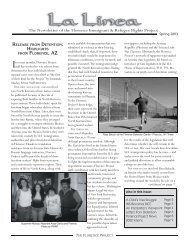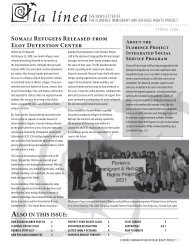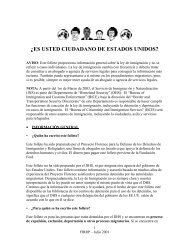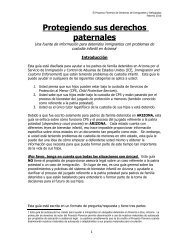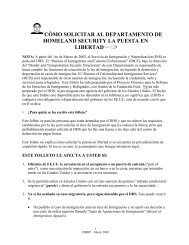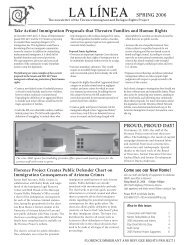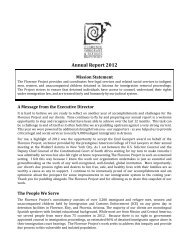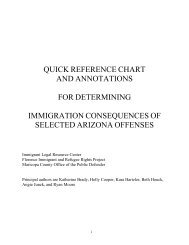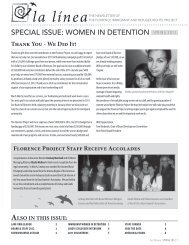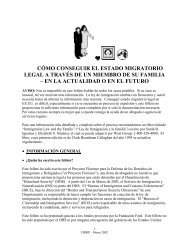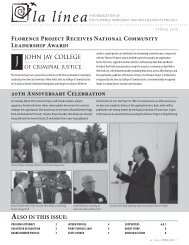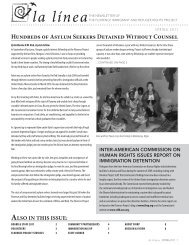HOW TO APPLY FOR ASYLUM - The Florence Project
HOW TO APPLY FOR ASYLUM - The Florence Project
HOW TO APPLY FOR ASYLUM - The Florence Project
You also want an ePaper? Increase the reach of your titles
YUMPU automatically turns print PDFs into web optimized ePapers that Google loves.
B. You establish:<br />
1. You have been physically in the U.S. continuously for at least seven years; and<br />
2. You have good moral character (this means you have not been convicted of certain crimes or spent 6<br />
months or more in jail); and<br />
3. You have not been convicted of an aggravated felony as defined by section 101(a)(43) of the INA (if<br />
you have certain other crimes or immigration offenses that make you inadmissible or deportable to<br />
the United States, you may still be eligible if you meet additional requirements); and<br />
4. You would suffer extreme hardship if you were removed from the U.S. or your spouse, parent or<br />
children who are lawful permanent residents or U.S. citizens would suffer such hardship if you were<br />
removed from the U.S.<br />
If you meet the above requirements but have criminal convictions, you should still bring up NACARA with the<br />
judge to see if you are eligible. Also, if you are not sure whether you applied for asylum by the deadline, you<br />
should ask the judge if you qualify to apply to stay in the United States under NACARA.<br />
If you were the spouse or child of a Salvadoran, Guatemalan or Eastern European who received suspension of<br />
deportation or cancellation of removal under NACARA at the time the person received NACARA relief, you<br />
may be eligible to apply for NACARA relief as a beneficiary as long as the spousal or parent relationship still<br />
exists. You may also be eligible for NACARA, if you are the unmarried son or daughter of a parent who<br />
received NACARA relief and you entered the U.S. on or before October 1, 1990.<br />
NOTE: <strong>The</strong> continuous physical presence requirements under NACARA do not apply if you enlisted in the<br />
U.S. armed forces while in the U.S., served 24 months in active duty status and were discharged honorably.<br />
Relief for Haitians<br />
In October 1998, Congress passed the Haitian Refugee Immigration Fairness Act of 1998 (HRIFA) that gave<br />
certain Haitians a way to stay in the U.S. and become lawful permanent residents. <strong>The</strong> deadline for applying<br />
for this type of relief for Haitians was March 31, 2000. However, under VAWA 2005, spouses (husband or<br />
wife) and children (including unmarried sons or daughters over 21 years of age) who were abused (battered or<br />
suffered extreme cruelty) by a spouse or parent who either was eligible for HRIFA or actually became a lawful<br />
permanent resident under HRIFA still may apply for lawful permanent resident status under HRIFA.<br />
For an abused spouse or child (including son or daughter) to apply under this law, the abusive spouse or parent<br />
must have been eligible under HRIFA and met the following requirements:<br />
<strong>The</strong> abusive spouse or parent:<br />
1Was physically in the United States on December 31, 1995;<br />
2Was physically present in the United States continuously since at least December 31, 1995 and had not been<br />
absent from the U.S. for more than 180 days total since December 31, 1995;<br />
AND<br />
3Filed for asylum and was present in the United States before December 31, 1995; or<br />
4 Was paroled into the United States prior to December 31, 1995 and identified as having a credible fear<br />
Page 48 of 49<br />
FIRRP- last update June 2007



